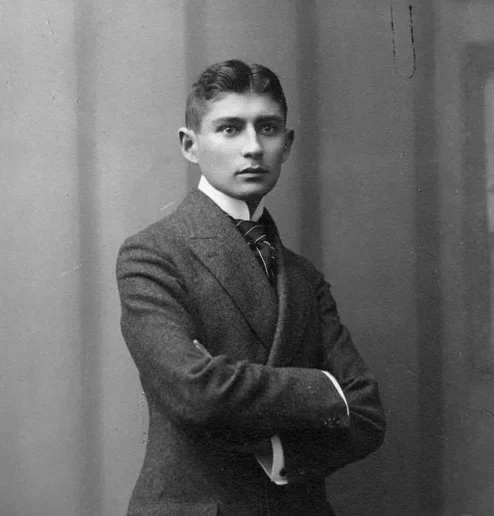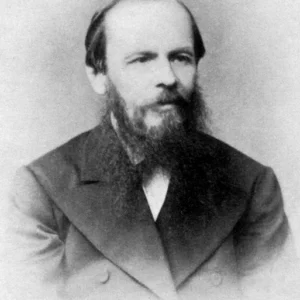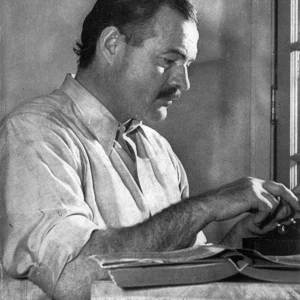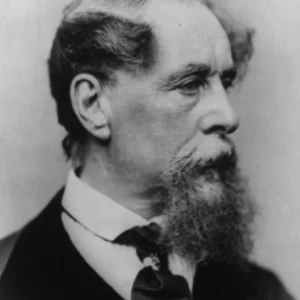Franz Kafka, born on July 3, 1883, in Prague, then part of the Austro-Hungarian Empire, is one of the most enigmatic and influential writers of the 20th century. Kafka’s works, characterized by their surreal and often nightmarish themes, have given rise to the term “Kafkaesque,” which describes situations that are absurd, disorienting, and illogically complex. His profound exploration of the human condition, alienation, and existential anxiety continues to resonate with readers worldwide.
Early Life and Education
Franz Kafka was born into a middle-class, German-speaking Jewish family. His father, Hermann Kafka, was a successful but domineering businessman, while his mother, Julie Löwy Kafka, came from a well-to-do, educated family. The relationship between Kafka and his father was fraught with tension, which deeply influenced Kafka’s psyche and later writings.
Kafka attended the German Charles-Ferdinand University of Prague, where he initially studied chemistry before switching to law. Despite his academic success, Kafka’s true passion lay in literature. He immersed himself in the works of writers such as Franz Grillparzer, Fyodor Dostoevsky, and Gustav Meyrink. Kafka’s university years were also marked by his close friendship with Max Brod, who would later become his literary executor and biographer.
Career Beginnings and Writing Style
After completing his law degree in 1906, Kafka began working at the Workers Accident Insurance Institute for the Kingdom of Bohemia. Although he was an efficient and conscientious employee, Kafka found his job unfulfilling and stifling. He often referred to his work as “bread labor,” implying that it was a means to an end rather than a source of personal satisfaction.
Kafka’s literary output during this period was prolific but largely unrecognized. He wrote primarily at night, dedicating himself to his craft despite his demanding job. His early works, such as “Description of a Struggle” and “Meditation,” showcased his unique blend of realism and surrealism. Kafka’s writing style, characterized by precise, clinical language and a deep sense of anxiety, began to take shape during these years.
Major Works and Themes
The Metamorphosis
Kafka’s most famous work, “The Metamorphosis,” was published in 1915. The novella tells the story of Gregor Samsa, a traveling salesman who awakens one morning to find himself transformed into a giant insect. This bizarre and unsettling premise is a hallmark of Kafka’s work, reflecting themes of alienation, identity, and the absurdity of existence.
Gregor’s transformation serves as a metaphor for the dehumanizing effects of modern society and the isolation that often accompanies it. Kafka’s portrayal of Gregor’s family’s reaction to his metamorphosis highlights the fragility of familial bonds and the conditional nature of love and acceptance.
The Trial
“The Trial,” published posthumously in 1925, is another of Kafka’s seminal works. The novel follows the harrowing ordeal of Josef K., a bank clerk who is inexplicably arrested and prosecuted by a shadowy, oppressive bureaucracy. Despite his attempts to understand and fight the charges, Josef K. is ultimately condemned by the faceless authorities.
“The Trial” is a powerful exploration of themes such as the loss of individual agency, the perils of an all-encompassing bureaucracy, and the existential dread that arises from the unknown. Kafka’s depiction of Josef K.’s futile struggle against an impenetrable system has made the novel a timeless critique of totalitarianism and the dehumanizing effects of authority.
The Castle
“The Castle,” another posthumously published novel, further explores Kafka’s fascination with absurdity and alienation. The protagonist, known only as K., arrives in a village governed by a mysterious and inaccessible castle. K.’s attempts to gain access to the castle and secure his position as a land surveyor are met with endless bureaucratic obstacles and confusion.
“The Castle” delves into themes of power, isolation, and the unattainable nature of true understanding. Kafka’s portrayal of the labyrinthine bureaucracy and the elusive authority of the castle underscores the futility of human effort in the face of an indifferent and irrational world.
Personal Struggles and Relationships
Kafka’s personal life was marked by struggles with health, relationships, and his sense of identity. He was plagued by various ailments, including tuberculosis, which ultimately claimed his life in 1924. Kafka’s frail health and existential anxieties are reflected in his writing, often manifesting as themes of physical and psychological decay.
Kafka’s relationships were complex and often troubled. He was engaged multiple times but never married. His most significant romantic relationships were with Felice Bauer, Milena Jesenská, and Dora Diamant. These relationships, documented through extensive correspondence, reveal Kafka’s deep-seated fears, insecurities, and longing for connection.
Kafka’s relationship with his father, Hermann, was particularly influential. The domineering and often abusive nature of his father left Kafka with a profound sense of inadequacy and a deep-seated fear of authority figures. This strained father-son relationship is a recurring theme in Kafka’s work, most notably in his “Letter to His Father,” a lengthy and candid account of his troubled relationship.
Impact on Literature and Culture
Franz Kafka’s impact on literature and culture is profound. His unique narrative style, characterized by a blend of realism and surrealism, has influenced countless writers, including Albert Camus, Jean-Paul Sartre, and Jorge Luis Borges. Kafka’s exploration of existential themes and his portrayal of the absurdities of modern life have made him a central figure in existential and absurdist literature.
The term “Kafkaesque” has entered the cultural lexicon to describe situations that are nightmarishly complex, illogical, and oppressive. Kafka’s ability to capture the alienation and absurdity of the human condition has made his works timeless and universally relevant.
Legacy and Influence
Kafka’s legacy extends far beyond his own time. His works have been translated into numerous languages and adapted into various forms of media, including film, theater, and opera. The Kafka Museum in Prague offers a comprehensive look at his life and work, preserving his legacy for future generations.
Kafka’s influence can be seen in the works of contemporary writers, filmmakers, and artists who continue to grapple with themes of alienation, bureaucracy, and the absurd. His ability to evoke a sense of existential dread and uncertainty resonates with readers and audiences, ensuring that his contributions to literature and culture remain enduring and impactful.
Conclusion
Franz Kafka’s life and work embody the complexities of the human condition and the often surreal nature of existence. His ability to blend realism with surrealism, creating nightmarish and absurd realities, has left an indelible mark on literature. From his early beginnings in Prague to his status as one of the most influential writers of the 20th century, Kafka’s journey is a testament to the power of imagination and the exploration of existential themes.
Through his novels, short stories, and personal writings, Kafka invites readers to delve into the depths of the human psyche, offering both a reflection of and a critique on the modern world. His contributions to literature and culture continue to be celebrated, ensuring that the legacy of the writer of Kafkaesque realities will endure for generations to come. Kafka’s exploration of alienation, identity, and the absurd remains relevant, inspiring and challenging readers to confront the complexities of their own existence.



